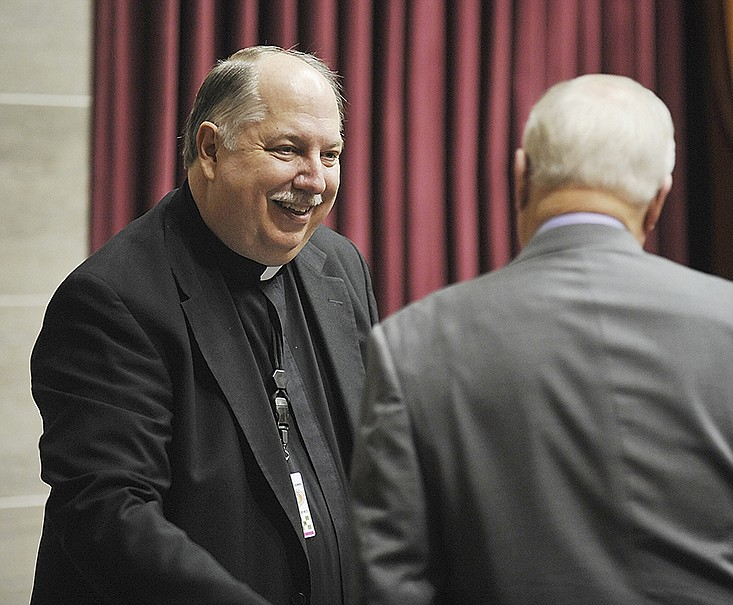How do you provide religious leadership in a "congregation" comprised of people of different faith backgrounds?
That's the challenge Monsignor Robert Kurwicki and Pastor Carl Gauck face on an almost daily basis - because they are the chaplains for the Missouri House and Senate.
"I began in 2011 with Speaker Steve Tilley," Kurwicki, 55 - a Catholic priest for 30 years - said last week. "I use the opening prayer so that it will touch each one of them, whether they are Christian, non-Christian, male, female, happily married or their marriage is falling apart, death in the family - all of that."
Gauck, 73 - a Lutheran minister for 45 years - has been the Senate's chaplain for 17 years.
"I begin the prayer with an acknowledgment of God as father, creator, and I end it in the Lord's name," Gauck said. "That's deliberate."
Although both men are Christians, they work to avoid regular references to their faith and, instead, offer more general prayers - although both will make references to important dates of faith.
Gauck said he tries to be sensitive to the different faith views of the senators and others who hear his prayers, but that doesn't force him to change what he generally does.
Kurwicki said he strives to remember that lawmakers "are a special group with special needs."
Several lawmakers told the News Tribune they thought both chaplains do a good job of offering prayers for all.
Kurwicki said: "When I received the job, a lot of people were giving me advice - but the best advice came from the members themselves.
"And what they are looking for in a chaplain - and what Speaker Tilley was looking for in a chaplain - was someone who would be a uniter and not a divider."
Kurwicki said he tries to emphasize "positive, love, unity, kindness - they're all very biblical notions, but they touch the human condition no matter who you are."
Both men acknowledged there are some who think the Legislature shouldn't have a chaplain - that their being there violates the constitutional prohibition against the state establishing a religion.
Kurwicki said: "It is the state that requests the chaplain, not the chaplain imposing himself on the Legislature.
"(And) since Missouri began in 1821, they've started the Legislature with prayer."
Gauck noted that Thomas Jefferson's phrase about a "wall of separation" between the church and state isn't in the Constitution, but flows from the First Amendment.
"(It) had to do with the Congregationalists, at that time, wanting to become the "state' church," Gauck said. "And he said you can't have that.
"Jefferson's freedom of expression of religion was very firm - and everybody should have that."
Both men do more than say a prayer at the beginning of each legislative day.
"You are the chaplain to all and, occasionally, called on for spiritual services," Gauck said. "It's not something I expect to happen often.
"But when it has happened - I've made hospital calls, pre-funeral calls and those kinds of things as it's been necessary."
Kurwicki noted the House chaplain's duties are defined as opening the House with prayer, visiting representatives when they're in the hospital and "to lead the House in prayer in times of emergency."
That third job was triggered Feb. 26, when Kurwicki was called on, with short notice, to lead a memorial service for anyone in the Capitol, just hours after State Auditor Tom Schweich's suicide had been made public.
"By being a parish priest, sometimes one phone call changes your whole day - and that was the case that day," he said. "I did not know Tom Schweich personally - but a lot of the members did, so I drew back to the understanding that, as a chaplain, you're a spiritual leader."
That brief service, he noted, included a recitation of Psalm 23 from the Hebrew Scriptures and the Christian Lord's Prayer.
Both men spend time getting to know the "people" they serve, not just their public, lawmaking "faces."
Kurwicki said the hardest part of his job is "seeing the anguish that some of these members go through, having to make up their minds on some of the votes they need to do.
"Because they are pressured from all sorts of sides (and) they do some real soul-searching."
He added: "It's easy to make fun of politicians, but the fact of the matter is - people don't pray for them."

